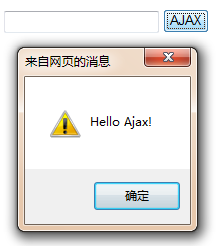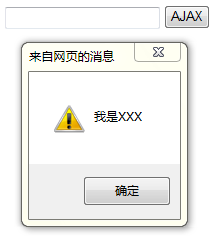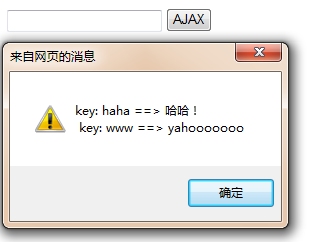首页 > 代码库 > JQuery Ajax调用asp.net后台方法
JQuery Ajax调用asp.net后台方法
利用JQuery的$.ajax()可以很方便的调用asp.net的后台方法。
先来个简单的实例热热身吧。
1、无参数的方法调用
asp.net code:
1 2 3 4 5 6 7 | using System.Web.Script.Services; [WebMethod] public static string SayHello() { return "Hello Ajax!"; } |
注意:1.方法一定要静态方法,而且要有[WebMethod]的声明
JQuery code:
1 2 3 4 5 6 7 8 9 10 11 12 13 14 15 16 17 18 19 20 21 22 | $(function() { $("#btnOK").click(function() { $.ajax({ //要用post方式 type: "Post", //方法所在页面和方法名 url: "data.aspx/SayHello", contentType: "application/json; charset=utf-8", dataType: "json", success: function(data) { //返回的数据用data.d获取内容 alert(data.d); }, error: function(err) { alert(err); } }); //禁用按钮的提交 return false; }); }); |
结果:

2、带参数的方法调用
asp.net code:
1 2 3 4 5 6 7 | using System.Web.Script.Services; [WebMethod] public static string GetStr(string str, string str2) { return str + str2; } |
JQuery code:
1 2 3 4 5 6 7 8 9 10 11 12 13 14 15 16 17 18 19 20 21 22 23 | /// <reference path="jquery-1.4.2-vsdoc.js"/> $(function() { $("#btnOK").click(function() { $.ajax({ type: "Post", url: "data.aspx/GetStr", //方法传参的写法一定要对,str为形参的名字,str2为第二个形参的名字 data: "{‘str‘:‘我是‘,‘str2‘:‘XXX‘}", contentType: "application/json; charset=utf-8", dataType: "json", success: function(data) { //返回的数据用data.d获取内容 alert(data.d); }, error: function(err) { alert(err); } }); //禁用按钮的提交 return false; }); }); |
运行结果:

下面进入高级应用罗
3、返回数组方法的调用
asp.net code:
1 2 3 4 5 6 7 8 9 10 11 12 | using System.Web.Script.Services; [WebMethod] public static List<string> GetArray() { List<string> li = new List<string>(); for (int i = 0; i < 10; i++) li.Add(i + ""); return li; } |
JQuery code:
1 2 3 4 5 6 7 8 9 10 11 12 13 14 15 16 17 18 19 20 21 22 23 24 25 26 27 28 29 | /// <reference path="jquery-1.4.2-vsdoc.js"/> $(function() { $("#btnOK").click(function() { $.ajax({ type: "Post", url: "data.aspx/GetArray", contentType: "application/json; charset=utf-8", dataType: "json", success: function(data) { //插入前先清空ul $("#list").html(""); //递归获取数据 $(data.d).each(function() { //插入结果到li里面 $("#list").append("<li>" + this + "</li>"); }); alert(data.d); }, error: function(err) { alert(err); } }); //禁用按钮的提交 return false; }); }); |
运行结果:

4、返回Hashtable方法的调用
asp.net code:
1 2 3 4 5 6 7 8 9 10 11 12 13 | using System.Web.Script.Services; using System.Collections; [WebMethod] public static Hashtable GetHash(string key,string value) { Hashtable hs = new Hashtable(); hs.Add("www", "yahooooooo"); hs.Add(key, value); return hs; } |
JQuery code:
1 2 3 4 5 6 7 8 9 10 11 12 13 14 15 16 17 18 19 20 21 22 | /// <reference path="jquery-1.4.2-vsdoc.js"/> $(function() { $("#btnOK").click(function() { $.ajax({ type: "Post", url: "data.aspx/GetHash", //记得加双引号 T_T data: "{ ‘key‘: ‘haha‘, ‘value‘: ‘哈哈!‘ }", contentType: "application/json; charset=utf-8", dataType: "json", success: function(data) { alert("key: haha ==> "+data.d["haha"]+"/n key: www ==> "+data.d["www"]); }, error: function(err) { alert(err + "err"); } }); //禁用按钮的提交 return false; }); }); |
运行结果:

5、操作xml
XMLtest.xml:
1 2 3 4 5 6 7 8 9 10 11 | <?xml version="1.0" encoding="utf-8" ?> <data> <item> <id>1</id> <name>qwe</name> </item> <item> <id>2</id> <name>asd</name> </item> </data> |
JQuery code:
1 2 3 4 5 6 7 8 9 10 11 12 13 14 15 16 17 18 19 20 21 22 23 | $(function() { $("#btnOK").click(function() { $.ajax({ url: "XMLtest.xml", dataType: ‘xml‘, //返回的类型为XML ,和前面的Json,不一样了 success: function(xml) { //清空list $("#list").html(""); //查找xml元素 $(xml).find("data>item").each(function() { $("#list").append("<li>id:" + $(this).find("id").text() +"</li>"); $("#list").append("<li>Name:"+ $(this).find("name").text() + "</li>"); }) }, error: function(result, status) { //如果没有上面的捕获出错会执行这里的回调函数 alert(status); } }); //禁用按钮的提交 return false; }); }); |
JQuery Ajax调用asp.net后台方法
声明:以上内容来自用户投稿及互联网公开渠道收集整理发布,本网站不拥有所有权,未作人工编辑处理,也不承担相关法律责任,若内容有误或涉及侵权可进行投诉: 投诉/举报 工作人员会在5个工作日内联系你,一经查实,本站将立刻删除涉嫌侵权内容。
